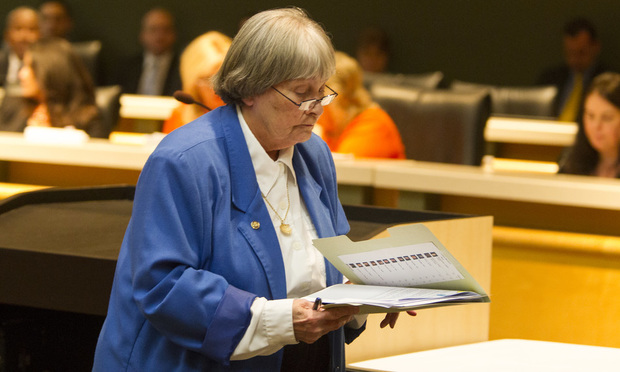NRA Appeals Federal Court Ruling on 'Jane Doe' in Gun Case
The gun-rights group filed the appeal after U.S. District Judge Mark Walker decided that previous court rulings forced him to reject the request to keep the identity of “Jane Doe” private.
May 21, 2018 at 12:50 PM
5 minute read

The National Rifle Association is appealing a federal judge's refusal to keep the identity of a 19-year-old Alachua County woman secret in a challenge to a state law that raised the age to purchase rifles and other long guns.
The case was placed on hold Friday pending a decision regarding “Jane Doe” from the U.S. Court of Appeals for the Eleventh Circuit, according to court documents.
The gun-rights group filed the appeal after U.S. District Judge Mark Walker decided that previous court rulings forced him to reject the request to keep the identity of “Jane Doe” private.
The NRA requested the use of the pseudonym for Jane Doe and “John Doe,” another 19-year-old who is part of the case. The request was based largely on a declaration filed by the group's Florida lobbyist, Marion Hammer, who detailed threatening emails she had received featuring derogatory words for parts of the female anatomy.
“It's time somebody stood up for the First Amendment right to go into court to fight to protect our Second Amendment right without being victimized by hatemongers who threaten you and your family,” Hammer, a onetime president of the national gun-rights organization, told The News Service of Florida on Friday.
The debate over the pseudonyms came in a lawsuit filed March 9 by the NRA, just hours after Gov. Rick Scott signed into law a sweeping school-safety measure that included new gun-related restrictions. The legislation was a rapid response to the Feb. 14 shooting at Parkland's Marjory Stoneman Douglas High School that left 17 students and faculty members dead and 17 others wounded.
The law raised from 18 to 21 the minimum age to purchase rifles and other long guns. It also imposed a three-day waiting period on the sale of long guns, such as the AR-15 semi-automatic rifle 19-year-old Nikolas Cruz last year legally purchased and is accused of using in the Valentine's Day massacre at his former high school.
In late April, the NRA filed a motion to add “Jane Doe” as a plaintiff to the lawsuit, which contends the age restriction in the new law “violates the fundamental rights of thousands of responsible, law-abiding adult Florida citizens and is thus invalid under the Second and Fourteenth Amendments.”
The NRA asked Walker to allow the woman to remain anonymous due to fear that public exposure could result in “harassment, intimidation, and potentially even physical violence.”
But, representing the state, lawyers for Attorney General Pam Bondi argued the request for anonymity “does not provide a sufficient basis for overcoming the strong presumption in favor of open judicial proceedings.”
Suggesting that the courts have not kept up with the times, a reluctant Walker agreed.
The Eleventh Circuit, which will hear the appeal, “has made it clear that pseudonyms may only be used in 'exceptional' cases … and that there is 'a strong presumption in favor of parties' proceeding in their own names,' ” the judge wrote in a 17-page opinion Sunday.
The relatively rare circumstances where pseudonyms are allowed involve issues such as abortion, prayer and personal religious beliefs, Walker wrote.
Based on precedent, “this court finds that mere evidence of threats and harassment made online is insufficient to outweigh the customary and constitutionally-embedded presumption of openness in judicial proceedings,” Walker wrote. “This is especially true where the targets of such threats and harassment are not minors and where the subject at issue does not involve matters of utmost intimacy.”
But, expressing sympathy for Jane and John Doe, Walker wrote that the factors laid out in the previous decisions fail to take into account “concerns about the potential harassment and threats they face.”
“To be clear, this court does not intend to diminish those concerns,” he added.
In a joint motion filed Friday, lawyers for the NRA and the state asked Walker to put the case on hold until the Atlanta-based appellate court decides on the pseudonyms. The judge agreed.
In a footnote in Sunday's order, Walker called the messages sent to Hammer “hateful and abhorrent” and of such an “offensive nature” that he would not repeat them in his ruling.
“The attorney general has made it clear that she won't agree to protecting a 19-year-old woman from bullying, harassment, threats of death or injury, and Judge Walker doesn't seem to think he has the authority or that it's his job to protect her, so maybe a higher court will,” Hammer said.
In Sunday's order, Walker noted that the world has changed since the courts established the standards allowing the use of pseudonyms.
“Today we have the internet, social media, and the 24-hour news cycle. What this means is that if a person attaches their name to a lawsuit — and especially if that lawsuit is sensational — then everyone will quickly be made aware of it. Articles get posted online, and the responding comments, tweets, and whatever-else-have-yous often devolve into a rhetorical barrage of hate. Unfortunately, it seems the internet just doesn't always bring out the best in us,” he wrote.
“Maybe the law should be modified to reflect these changes. But it's not this court's job to change the law; this court's job is to apply the law,” Walker wrote. “And the law unfortunately directs that the NRA's motion must be denied.”
Dara Kam reports for the News Service of Florida.
This content has been archived. It is available through our partners, LexisNexis® and Bloomberg Law.
To view this content, please continue to their sites.
Not a Lexis Subscriber?
Subscribe Now
Not a Bloomberg Law Subscriber?
Subscribe Now
NOT FOR REPRINT
© 2025 ALM Global, LLC, All Rights Reserved. Request academic re-use from www.copyright.com. All other uses, submit a request to [email protected]. For more information visit Asset & Logo Licensing.
You Might Like
View All
Meta agrees to pay $25 million to settle lawsuit from Trump after Jan. 6 suspension
4 minute read
Executive Assistant, Alleging Pregnancy Discrimination and Retaliation, Sues Florida Healthcare Entrepreneur
3 minute read
Trending Stories
- 1Gunderson Dettmer Opens Atlanta Office With 3 Partners From Morris Manning
- 2Decision of the Day: Court Holds Accident with Post Driver Was 'Bizarre Occurrence,' Dismisses Action Brought Under Labor Law §240
- 3Judge Recommends Disbarment for Attorney Who Plotted to Hack Judge's Email, Phone
- 4Two Wilkinson Stekloff Associates Among Victims of DC Plane Crash
- 5Two More Victims Alleged in New Sean Combs Sex Trafficking Indictment
Who Got The Work
J. Brugh Lower of Gibbons has entered an appearance for industrial equipment supplier Devco Corporation in a pending trademark infringement lawsuit. The suit, accusing the defendant of selling knock-off Graco products, was filed Dec. 18 in New Jersey District Court by Rivkin Radler on behalf of Graco Inc. and Graco Minnesota. The case, assigned to U.S. District Judge Zahid N. Quraishi, is 3:24-cv-11294, Graco Inc. et al v. Devco Corporation.
Who Got The Work
Rebecca Maller-Stein and Kent A. Yalowitz of Arnold & Porter Kaye Scholer have entered their appearances for Hanaco Venture Capital and its executives, Lior Prosor and David Frankel, in a pending securities lawsuit. The action, filed on Dec. 24 in New York Southern District Court by Zell, Aron & Co. on behalf of Goldeneye Advisors, accuses the defendants of negligently and fraudulently managing the plaintiff's $1 million investment. The case, assigned to U.S. District Judge Vernon S. Broderick, is 1:24-cv-09918, Goldeneye Advisors, LLC v. Hanaco Venture Capital, Ltd. et al.
Who Got The Work
Attorneys from A&O Shearman has stepped in as defense counsel for Toronto-Dominion Bank and other defendants in a pending securities class action. The suit, filed Dec. 11 in New York Southern District Court by Bleichmar Fonti & Auld, accuses the defendants of concealing the bank's 'pervasive' deficiencies in regards to its compliance with the Bank Secrecy Act and the quality of its anti-money laundering controls. The case, assigned to U.S. District Judge Arun Subramanian, is 1:24-cv-09445, Gonzalez v. The Toronto-Dominion Bank et al.
Who Got The Work
Crown Castle International, a Pennsylvania company providing shared communications infrastructure, has turned to Luke D. Wolf of Gordon Rees Scully Mansukhani to fend off a pending breach-of-contract lawsuit. The court action, filed Nov. 25 in Michigan Eastern District Court by Hooper Hathaway PC on behalf of The Town Residences LLC, accuses Crown Castle of failing to transfer approximately $30,000 in utility payments from T-Mobile in breach of a roof-top lease and assignment agreement. The case, assigned to U.S. District Judge Susan K. Declercq, is 2:24-cv-13131, The Town Residences LLC v. T-Mobile US, Inc. et al.
Who Got The Work
Wilfred P. Coronato and Daniel M. Schwartz of McCarter & English have stepped in as defense counsel to Electrolux Home Products Inc. in a pending product liability lawsuit. The court action, filed Nov. 26 in New York Eastern District Court by Poulos Lopiccolo PC and Nagel Rice LLP on behalf of David Stern, alleges that the defendant's refrigerators’ drawers and shelving repeatedly break and fall apart within months after purchase. The case, assigned to U.S. District Judge Joan M. Azrack, is 2:24-cv-08204, Stern v. Electrolux Home Products, Inc.
Featured Firms
Law Offices of Gary Martin Hays & Associates, P.C.
(470) 294-1674
Law Offices of Mark E. Salomone
(857) 444-6468
Smith & Hassler
(713) 739-1250







